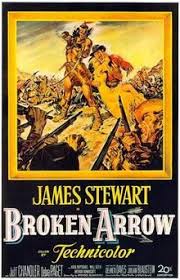 1950 was an important year both for westerns and Jame Stewart. Stewart appeared in Winchester ’73, directed by Anthony Mann, and Broken Arrow, directed by Delmer Daves. Winchester ’73 is generally seen as the first of a series of morally complex westerns made by Mann and Stewart and which inaugurated a decade of such morally complex westerns by others. The importance of Broken Arrow, however, is that it inaugurated an increasingly more nuanced portrayal of American Indians in those westerns.
1950 was an important year both for westerns and Jame Stewart. Stewart appeared in Winchester ’73, directed by Anthony Mann, and Broken Arrow, directed by Delmer Daves. Winchester ’73 is generally seen as the first of a series of morally complex westerns made by Mann and Stewart and which inaugurated a decade of such morally complex westerns by others. The importance of Broken Arrow, however, is that it inaugurated an increasingly more nuanced portrayal of American Indians in those westerns.
Broken Arrow plays fast and loose with historical facts, but it is based on (some) real people. Tom Jeffords (a real person, played by Stewart) is prospecting for gold when he comes across an injured Apache boy. There is currently war between the Apaches and the settlers, based in Tucson, but Jeffords stops to nurse the boy back to health. In listening to the the boy talk, he first realizes that Apaches are not so very different as he had thought.
In Tucson, however, the people exist in a state of virtual siege. They cannot even get the mail sent out without it being intercepted and the mail carriers are killed by Cochise, the Apache chief, and his warriors. Jeffords is disgusted with the general tone of hatred and desire to kill, so he sets out on a perilous journey to enter Cochise’s stronghold and talk with the chief, who has not been seen by non-Indians for years.
This meeting between Jeffords and Cochise did actually take place, though the reason for it is unknown. Some say he deliberately went to meet them and others that he was captured and impressed them with his bravery. Either way, Jeffords did meet Cochise and formed a friendship (though not as blood brothers, as in the film). In the film, Jeffords negotiates a deal with Cochise (Jeff Chandler) where the Apaches will allow the mail to go through, though the war is by no means over. He also meets and begins to fall in love with a young Apache woman named Sonseeahray (Debra Paget, a character created for the film).
The rest of the film follows Jeffords attempt, along with General Howard (another actual historical figure, played by Basil Ruysdael) to negotiate a lasting peace with Cochise. There is much resistance, however, from both the settlers and Apaches, to the idea of peace, even after a treaty has been signed.
The film presents a simplified version of the tensions/war between the Apaches and settlers and historically the treaty that was signed did not last long, but the film is still a very interesting one (for a riveting account of the Apache Wars, read David Roberts Once They Moved Like The Wind : Cochise, Geronimo, And The Apache Wars). Although many American Indians were cast as Apaches (Jay Silverheels plays Geronimo), the two leads were played by non-Indians. They do, however, play their roles with a great deal of dignity and no condescension.
But what made the film especially interesting to me was how the script demonstrates how two groups of people could, entirely naturally and even understandably, be in the position of demonizing the other. American settlers were notorious for being unable to even distinguish between different tribes, let alone different individuals within specific tribes. But American Indians could also see the settlers as one entire group without distinguishing between individuals. Broken Arrow is about seeing people as individuals.
(Some Spoilers) My sister observed that the reason Jeffords is able to take a more rational and less emotional approach to the war with the Apaches is because he has not lost anyone. Rancher Ben Slade (Will Geer) lost his wife in an Apache raid and loathes the Apaches. Nearly everyone in Tucson (which is portrayed accurately as a rowdy, lawless town) has lost someone dear in the war. The same is true with Cochise and the Apaches. Each and every one of them has a real reason to hate, hence the killing and the hatred continues.
But when Slade attempts to destroy the treaty by murdering Cochise, he is unable to kill Cochise, but kills Jefford’s wife, Sonseeahray, instead. Now Jeffords is consumed with hatred and wants to see Slade murdered, showing that Jeffords is really no different from anyone else. It is then Cochise who rises to the occasion and tells Jeffords that he must yield his sense of entitlement to revenge and let the law takes it course. Otherwise, the treaty will never have a chance to take hold. In that moment, Cochise emerges as the true hero of the film.
Tragically, the Apache Wars were far from over and many treaties would be broken and many more people would die, ending with the removal of all Apaches from their homeland. But the film is a well-acted and well-made film and thoroughly worth seeing for its humane examination of how and why it is so easy to fall into self-perpetuating hatred.
The film was directed by Delmer Daves, an underrated director who made some excellent westerns, including a personal favorite: The Hanging Tree. His westerns tend to be thoughtful, as well as exciting, and I believe he definitely deserves to be better known as a director of westerns.
Broken Arrow is my contribution to “The Great Western Blogathon,” hosted by Thoughts All Sorts.

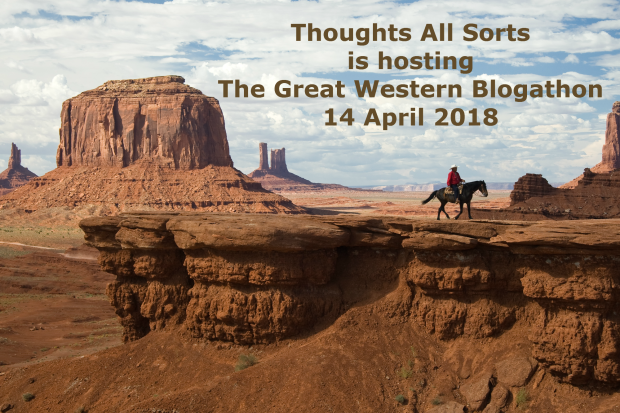
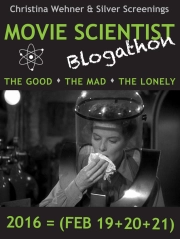
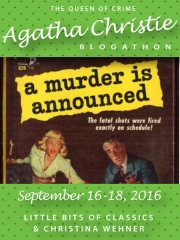


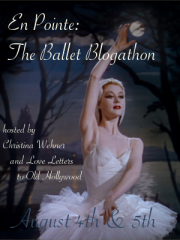

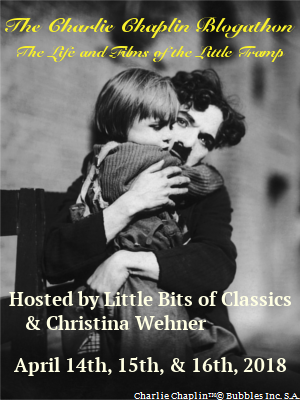
silverscreenclassicsblog
April 13, 2018 at 3:26 pm
Great review of s great film. Jimmy Stewart is fantastic as always and couldn’t agree more that Delmer Daves was a very underrated director. You mentioned The Hanging Tree which I haven’t seen. Will definitely check it out! Thanks Christina! Regards from Paul
LikeLiked by 1 person
christinawehner
April 13, 2018 at 3:28 pm
Thanks! The Hanging Tree is really excellent; I hope you get a chance to see it! Seeing Broken Arrow has made me want to check out more of his westerns now, too. 🙂
LikeLiked by 1 person
thoughtsallsorts
April 13, 2018 at 10:05 pm
Wow…I missed this one??? I can’t believe it…I have a great deal of westerns yet to watch I see. This one sounds really interesting and thought provoking. I always enjoy when movies present a genre from a different perspective and this one sure does.
Thanks for joining my blogathon and I’m looking forward to watching Broken Arrow. Can’t wait!
LikeLiked by 1 person
christinawehner
April 14, 2018 at 12:53 pm
It’s definitely worth seeing! I wonder if it somehow fell under the shadow of Stewart’s other film, Winchester ’73. And then he made so many other great westerns in that decade…an embarrassment of riches, perhaps?
Thanks so much for hosting!
LikeLiked by 1 person
thoughtsallsorts
April 14, 2018 at 1:29 pm
Will keep an eye out for it…so many wonderful westerns have come my way today.
LikeLiked by 1 person
Patricia Nolan-Hall (@CaftanWoman)
April 14, 2018 at 4:23 am
A thoughtful movie and very well done. Delmar Daves was a complete professional. In my list of favourite western films, and I do hate rating creativity, both this and The Hanging Tree fall just a tiny notch below the lean, mean 3:10 to Yuma from 1957. I suppose it is purely a matter of taste.
LikeLiked by 1 person
christinawehner
April 14, 2018 at 1:00 pm
Oh, I forgot he made that one!! I finally saw 3:10 to Yuma last year and was really impressed. It almost seemed a bit noirish to me, at times. It seems so different from The Hanging Tree – which shows how versatile he was!
LikeLike
maddylovesherclassicfilms
April 14, 2018 at 5:13 am
Loved your review of this great film. This is a terrific Western. I like how it focused more on the American Indians and their lives for a change. I also am a fan of The Hanging Tree.
LikeLiked by 1 person
christinawehner
April 16, 2018 at 9:17 pm
Thanks! It really does stand out, doesn’t it, for it’s portrayal of the Apache. Often, on derives the impression from the movies that American Indians were just sitting around on their horses, waiting for someone to attack, as if that’s all they do.
The Hanging Tree is marvelous, isn’t it!
LikeLiked by 1 person
maddylovesherclassicfilms
April 17, 2018 at 4:12 am
Exactly! It was nice to see a film depicting them as something other than killers and hunters. The Hanging Tree is terrific, I think Gary Cooper’s performance is one of his very best.
LikeLiked by 1 person
christinawehner
April 17, 2018 at 2:31 pm
Yes, I so agree! Very subtle.
LikeLike
gary loggins
April 14, 2018 at 5:34 am
One of the few Westerns I haven’t seen.. yet! Thanks for a great review.
LikeLike
christinawehner
April 14, 2018 at 1:01 pm
Thanks! I hope you get a chance to see it!
LikeLiked by 1 person
Paul
April 14, 2018 at 11:39 am
Good, thoughtful review! I’ve always been a fan of Jimmy Stewart in general, and his westerns from the early 1950s are big favorites of mine. “Broken Arrow” is in my top 10. Well done, Christina!
LikeLiked by 1 person
christinawehner
April 14, 2018 at 1:03 pm
Thanks! Yes, I think it was his westerns that turned me into a fan of his. What a great run he had of western films!
LikeLike
The Flapper Dame
April 14, 2018 at 12:12 pm
I sound like a broken record as of late because I say this a lot about movies- but I need to see more James Stewart westerns!!! Don’t be too harsh on me!!
LikeLiked by 1 person
christinawehner
April 14, 2018 at 1:12 pm
I know what you mean! I’m always making lists of movies I need to see after blogathons. 🙂 I hope you have a lovely time watching Jimmy Stewart westerns!
LikeLike
Megan
April 24, 2019 at 8:30 am
That is a great review. I quite agree with your sister’s opinion. People find it easier to be more sensible about something when they have not been through an emotional trauma.
LikeLike
srogouski
January 19, 2020 at 12:26 pm
It’s a pretty good movie. The only thing that made me cringe was the age difference between Deborah Paget and Jimmy Stewart. Oliver Howard (namesake of Howard University) is an interesting figure. Hardcore abolitionist and anti-racist, he did negotiate a treaty with Cochise. But he also helped drive Chief Joseph and his people out of their homeland in the Pacific Northwest.
LikeLike